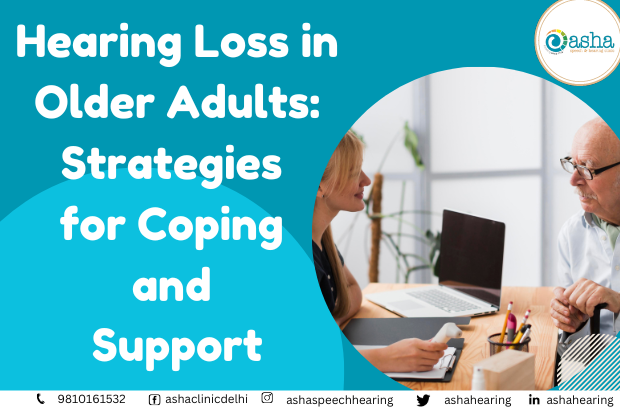Hearing loss is a common problem among older adults. On average, hearing impairment affects one in every three persons aged 65 to 74. Also, nearly 50% of seniors over the age of 75 suffer from hearing loss. Typically, this disorder progressively reduces a person’s capacity to hear sounds, comprehend words, and participate completely in social situations. In addition to its effects on physical health, hearing loss also impacts emotional stability, cognitive performance, and general quality of life. However, caregivers can effectively manage this condition by following certain strategies for coping and supporting hearing loss in older adults as suggested in this blog.
If you are unsure how to help older adults with hearing loss, continue reading this blog. Here, we have shared detailed information on the causes and symptoms of hearing loss along with coping strategies to assist families, individuals, and caretakers in proactively addressing this issue.
Causes of Hearing Loss in Seniors
People of all ages can be affected by hearing loss, but older adults are more likely to have it. Hearing loss in seniors is frequently caused by these reasons
- Natural aging process
- Long-term noise exposure
- Medical conditions like cardiovascular diseases and diabetes
- Use of Ototoxic Medications for extended periods
Symptoms and Signs of Hearing Loss in Elders
Older adults will show the following symptoms and signs if they suffer from hearing loss.
- Difficulty in understanding what others speak
- Miss out conversations
- Misinterpret or Misunderstand conversation
- Ask people to repeat
- Turn up the volume on the TV, radio, or other devices louder than usual
- Tinnitus [a sensation of ringing, buzzing, or other sounds in the ears]
Note that, we recommend individuals who exhibit these symptoms seek medical attention from a primary care physician or an audiologist.
Can Seniors With Hearing Loss Be Treated?
Most types of hearing loss are permanent. Therefore hearing ability cannot be fully recovered in the majority of cases. Nonetheless, the following approaches might help to control hearing impairment and enhance communication.
- Use of Hearing Aids
- Assistive Listening Devices
- Cochlear Implants
- Lip-reading and Communication Training
- Counseling and Support
Know How to Support Older Adults with Hearing Loss
If your elderly parents or grandparents suffer from hearing loss, then follow these strategies to provide your valuable support to them. Remember, anyone who is taking care of the elders may implement the below-suggested hearing loss coping strategies and tips.
Show sympathy
Seniors who have hearing loss experience far greater frustration than you do. So, don’t say to someone, “Never mind, it’s not important.” It merely gives the impression that the person is not significant enough to be included.
Have Patience
People suffering from hearing loss typically wait 5-7 years before taking action. Your care might speed up the process, but if you experience any frustration along the way, keep in mind that this is a challenging and lengthy process.
Demonstrate Understanding
Seniors who experience hearing loss may also experience stress, tension, despair, social isolation, irritability, negativity, and rage, according to studies. Don’t allow their demeanor to depress you. Make an effort to comprehend the challenging circumstances they face daily.
Be Respectful
Speak honestly and spontaneously, but do not speak on their behalf. Ask explicit questions or reword the conversation so that he or she can talk for himself or herself.
Recommend Hearing Aids
Discuss the use of hearing aids with seniors who suffer from hearing impairment. Hearing aids are the best way for most seniors to improve their hearing as they grow older. Hearing aids are now smaller, less obtrusive, and more advanced than ever before, and they can considerably improve communication and quality of life. Even, with the proper hearing aids, your loved one can hear emergency alarms, smoke detectors, ringing phones, and doorbells.
Promote the Wearing of Hearing Aids
Some elderly people are reluctant to acknowledge that they have hearing loss and find it embarrassing to wear them in public. So, they choose not to get hearing aids or are unwilling to wear them. A few people also worry about the usefulness or price. If you wish to persuade seniors to use a hearing aid, first describe to them how hearing loss is a typical aspect of aging and then inform them how hearing aids can enhance their interaction with others.
Refrain from Being Overly Supportive
Avoid being the senior’s “ears.” Though you may believe you are supporting a loved one, in reality, you are creating a codependent connection that can eventually harm them.
Points to Remember When Speaking To Seniors With Hearing Loss
The following are some important tips that one must follow while speaking to older adults with hearing loss.
- Speak face-to-face
- Reduce background noise
- Speak clearly and don’t mumble or lower your voice when finishing a statement.
- When you talk, use your hand gestures and facial expressions.
- Don’t speak too fast or too sluggish; instead, speak at a reasonable pace.
- Speak louder, but never scream. Shouting warp words.
- Reword what you have said. A special kind of hearing loss affects some seniors, making it harder for them to hear sounds like “shhh.”
- Encourage active listening.
The Bottom Line
Adequate understanding of this disorder might enable elders and their caregivers or family members to seek timely intervention and support. The secret to effectively controlling hearing loss is early intervention. Seniors who are suffering from hearing loss should go to a clinic and speak with an audiologist or primary care physician to get a thorough assessment and treatment recommendations that are specific to their needs.
If you need help from the best audiologists in India, book an appointment at Asha Speech and Hearing Clinic. The trained professionals from our team will provide personalized therapy for older adults who suffer from hearing loss.

